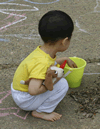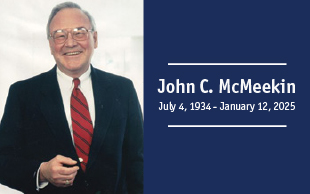PHMC programs address barriers that prevent families from achieving the goal of living in a safe, comfortable atmosphere
Helping Parents Raise Their Children Lead-Free
When The Washington Post reported in 2004 that there were high levels of lead in the drinking water in the District of Columbia, the Environmental Protection Agency responded by teaming up with National Nursing Centers Consortium, which had experience with lead programs in Philadelphia, to create Lead Safe DC to educate families about the dangers of lead poisoning. Lead Safe DC now offers three lead safety outreach initiatives. The first focuses on primary prevention and helps inform families who live in the neighborhoods where many of the children have elevated blood levels. The second Lead Safe DC initiative responds to children who have been tested for lead and whose blood results indicate that they have been exposed to dangerous levels of lead. The program works with their parents to help them reduce that level. The third initiative is a lead poisoning prevention program to help ensure that children placed into foster care are not exposed to lead dangers.

Lead Safe DC director Harrison Newton testifies to the District of Columbia Council in support of groundbreaking lead poisening prevention legislation.
For the past nine years, NNCC has run Lead Safe Babies, a similar program in Philadelphia that reaches 1,300 families per year by coordinating with several nurse-managed health centers throughout the city to educate parents and screen homes for lead. “Both Philadelphia and Washington, D.C. are very old cities and a great number of people who live in urban areas may be living in homes with lead-based paint,” says Harrison Newton, director of NNCC’s environmental health programs. “Homes are not static environments. Over time, general wear and tear, renovations and even the weather can release particles of lead-based paint into your home.”
See our tips on how to keep your home lead free.
DEFA Ensures HIV/AIDS Patients Have a Home
The DEFA program works exclusively with HIV/AIDS patients and is administered by PHMC for the Philadelphia Department of Public Health’s AIDS Activities Coordinating Office and the city’s Office of Housing and Community Development, with funding from HUD’s Housing Opportunities for People with AIDS program. “Under our watch, not one DEFA recipient has been homeless,” says DEFA program coordinator Linda Hazelwood. “There may not be a cure for HIV/AIDS yet,” she says, “but we can at least help make clients comfortable.” DEFA helps recipients with housing, including mortgage, rent and essential utilities, as well as with medical treatment and equipment related to HIV/AIDS. In the past year, 85% of DEFA applications asked for housing funds. DEFA works with an average of 500 clients each year.
Stability for Children and Their Parents
As part of a contract with Philadelphia’s Department of Human Services (DHS), PHMC administers the DHS Emergency Fund, which last year provided housing support to 2,693 children and their families. The DHS Emergency Fund works with families who are already in stable housing by helping parents and caregivers pay for items such as rent, utilities, housing repairs, appliances and rent arrears. “On average we receive 50 applications for DHS emergency funds a week,” says Rich Kirschner, administrative coordinator. The fund, which began in 2002, operates with the goal of achieving permanent housing and stability for children in foster care or adoption or who may be separated from their families.
Healthy, Safe Food for Families in Shelters
HPC’s Child and Adult Care Food Program (CACFP) is all about food, more specifically how to cook it right. CACFP, which is funded by the United States Department of Agriculture and staffed by HPC, works with the City of Philadelphia's Office of Supportive Housing to provide training and technical support to eight emergency housing sites across the city. In addition to developing menus, CACFP provides cooks with on-site and off-site training and helps kitchen workers obtain ServSafe® certification, a nationally recognized and accredited food safety credential. “We teach food safety to the culinary staff of emergency housing facilities to enable them to better serve their clients,” says Lynne Snyder, program coordinator of CACFP.
See our special feature on food safety tips.
Healthy Toy Shopping
 When it comes to lead safety, children are of paramount importance. “Learning disabilities, attention deficit disorders and the loss of executive functioning are just some of the things that can occur when a child gets lead poisoning,” says Harrison Newton, director of NNCC’s environmental health programs. With recent reports of lead-based toys and children’s jewelry coming into the US, parents need to be aware of lead poisoning risks when buying their children holiday presents. Most toys have very little lead in them, but even a small amount can be lethal if swallowed by a child. Newton advises that if you are buying toys for a child under three who may put things in his or her mouth, avoid buying toys with small parts. Additionally, look for well-made toys that will not break easily. Avoid giving your children older toys. Old toys are far more likely to contain lead.
When it comes to lead safety, children are of paramount importance. “Learning disabilities, attention deficit disorders and the loss of executive functioning are just some of the things that can occur when a child gets lead poisoning,” says Harrison Newton, director of NNCC’s environmental health programs. With recent reports of lead-based toys and children’s jewelry coming into the US, parents need to be aware of lead poisoning risks when buying their children holiday presents. Most toys have very little lead in them, but even a small amount can be lethal if swallowed by a child. Newton advises that if you are buying toys for a child under three who may put things in his or her mouth, avoid buying toys with small parts. Additionally, look for well-made toys that will not break easily. Avoid giving your children older toys. Old toys are far more likely to contain lead.





